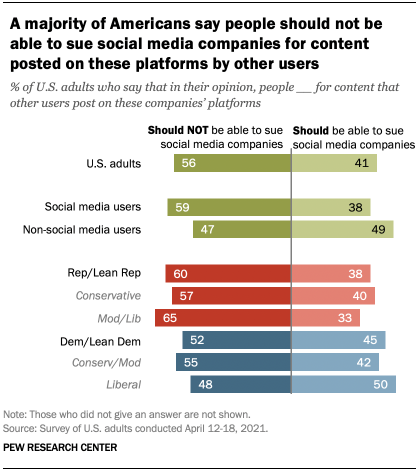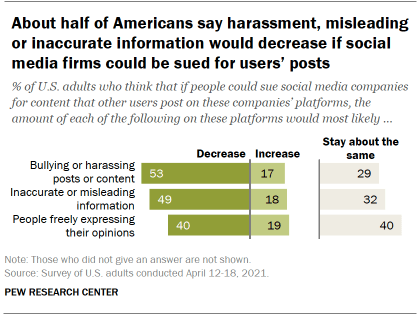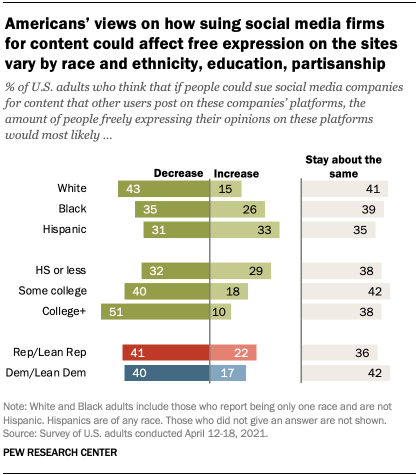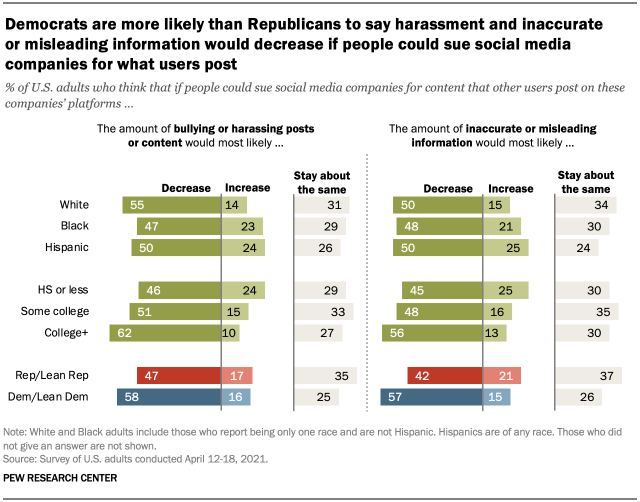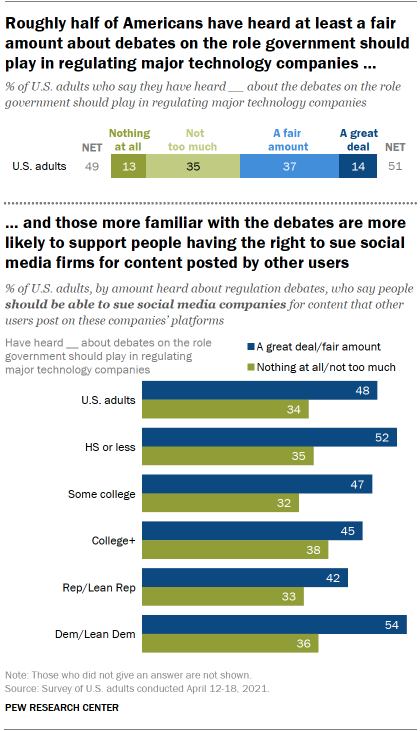Some 56% of U.S. adults say people should not be able to sue social media companies for content that other users post on these companies’ platforms, according to a new survey conducted April 12-18, 2021. At the same time, 41% say people should be able to do this.
The right to sue social media companies in this way is one issue at the heart of current debates surrounding Section 230 of the Communications Decency Act, which some lawmakers argue should be amended or repealed. This federal legislation currently protects online platforms from being held liable for content that is posted by users on websites and social media – while also allowing the sites to remove content if they do so in “good faith.” Opponents of changing the law assert that the existing regulation is crucial to protecting speech online and for tech companies to reasonably operate their platforms. Some say it “built” the internet as we know it.
Social media users themselves are more likely than non-users to oppose the idea that people should be able to sue these companies for what others post (59% vs. 47%).
Pew Research Center has long studied Americans’ views of whether and how technology companies should be regulated and the potential impacts of these decisions on Americans’ digital lives.
To understand what Americans think about the prospect of holding social media companies liable for content posted on their platforms, we surveyed 4,623 U.S. adults from April 12 to 18, 2021. Everyone who took part is a member of the Center’s American Trends Panel (ATP), an online survey panel that is recruited through national, random sampling of residential addresses. This way nearly all U.S. adults have a chance of selection. The survey is weighted to be representative of the U.S. adult population by gender, race, ethnicity, partisan affiliation, education and other categories. Read more about the ATP’s methodology.
Here are the questions, responses and methodology used for this analysis.
Even though the legislation has been a source of political disagreement, there are only modest partisan differences in Americans’ views of the issue. These are driven to some degree by ideology. Republicans and GOP-leaning independents who identify as moderate or liberal are most likely to oppose the idea of people being able to sue (65%), while 57% of conservative Republicans say the same. Some 55% of conservative or moderate Democrats and Democratic leaners also say this, while liberal Democrats are more evenly split.
How Americans think the right to sue could impact key parts of online life
The survey also explored public views about three possible ways that activity on social media platforms might change if people were allowed to sue the platforms for content posted by other users.
Some policymakers who say new and stricter rules are needed argue that since social media platforms aren’t held accountable for content that is posted on their platforms, the companies have little incentive to properly protect users from harmful speech. The survey finds that roughly half of Americans think the prospect of lawsuits against social media firms would most likely decrease the amount of bullying or harassing content (53%) and information that is inaccurate or misleading (49%) on these platforms.
At the same time, four-in-ten Americans think that this type of action would most likely decrease the number of people who freely express their opinions on the platforms. These findings come as some argue Section 230 legal protections give too much leeway to tech firms that are not policing content fairly, allowing individual companies to make rules about what speech is and is not allowed on their platforms without being accountable for the decisions. By contrast, 19% of Americans say the number of people freely speaking their opinions would increase with the right to sue.
Another share of Americans say that there would be little impact in these areas – that is, that harassment (29%), inaccurate or misleading information (32%) and the number of people freely expressing their opinions (40%) would stay about the same.
Not all Americans are equally likely to think the amount of these types of content would change with the right to sue. For example, roughly three-in-ten of those with a high school diploma or less say that the number of people who freely express their opinions on these platforms would most likely increase if people could sue over content. Smaller shares of those with more formal education say the same.
White adults are less likely than Hispanic or Black adults to say this type of free expression would increase. (There were not enough Asian American respondents in the survey to be broken out separately. As always, their responses are incorporated into the general population figures reported throughout this analysis.)
Republicans are slightly more likely than Democrats to say the number of people freely expressing their opinion would increase if people could sue social media companies over user content, while Democrats are slightly more likely than Republicans to say it would stay about the same.
As far as what might happen with potentially harmful content on these platforms, majorities of Democrats say that the amount of bullying or harassing posts or content and the amount of misleading or inaccurate information would most likely decrease as a result of people being able to sue in this way. Smaller shares of Republicans say the same.
Liberal Democrats (64%) are most likely to say harassment would decrease if people could sue social media companies. Similarly, 62% of liberal Democrats say that the amount of misleading or inaccurate content would most likely decrease if people could sue, compared with 53% of conservative or moderate Democrats and roughly four-in-ten Republicans regardless of ideology.
For both types of content, a larger share of those with a bachelor’s degree or higher say each type of harmful content would decrease, compared with those having less formal education.
Views on what might happen to harassment also vary somewhat by race and ethnicity. A majority of White adults say this would most likely decrease, compared with a smaller share of Black adults. Roughly half of adults regardless of race or ethnicity say that inaccurate or misleading information would decrease, though Black adults and Hispanic adults are more likely than White adults to say the amount of these types of content might increase.
Views on the right to sue social media companies vary by Americans’ awareness of regulation debates
The debate surrounding this law and related issues intensified in 2020 when then-President Donald Trump signed an executive order trying to curb social media firms’ use of the legislation to protect themselves. President Joe Biden repealed that order but has said in the past he wants to revoke Section 230.
When it comes to how closely Americans have been following the conversation about government regulation of “Big Tech,” 51% say they’ve heard at least a fair amount about the debates on the role government should play in regulating major technology companies, while a similar share (49%) say they’ve heard “nothing at all” or “not too much.”
Support for suing social media companies for what others post varies by this level of awareness. Those who are familiar with these conversations are 14 percentage points more likely than others who have heard less to support the right to sue social media companies for user content (48% vs. 34%).
Note: Here are the questions, responses and methodology used for this analysis.



